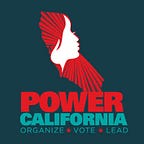Until We Are All Free: From Shame to Wholeness
By Aimee Thorne-Thomsen, MIV Board Member and Public Voices Fellow
Earlier this month I had the honor of attending a convening organized by Mobilize the Immigrant Vote and CultureStr/ke with racial justice, refugee rights and immigrant rights activists and cultural workers. Until We Are All Free brought us together to envision how we can use cultural strategies that embrace all our communities and lift up all our voices in the fight for justice. With the backdrop of increasing detention of immigrants, violent policing of communities of color and #BlackLivesMatter, activists often focus on changing hearts and minds about who our families are, and reclaiming our full humanity. Yet, what often gets lost in these conversations is another piece that denies us our human dignity and keeps us isolated from each other — the stigma associated with being captured by the system, whether through incarceration, detention or deportation. That shame seeps into our families, isolates our communities and silences us when we most need to speak up.
As we gathered in Little Tokyo, we slowly built a community where we could talk about the pain, trauma and fear that pervades families impacted by incarceration, detention and deportation. We shared our frustration with how a loved one’s entire life could be defined by and reduced to “one mistake.” Our difficulty in talking about the shame and stigma associated with incarceration is further weighed down by how deeply connected incarceration is to race, gender, class and nationality. We can see the impact of stigma on others — transgender and gender nonconforming people, people who experience abortion, people living with HIV/AIDS, for example. We know firsthand the damage that shame causes. And yet in sharing our stories with each other, we broke down those walls of silence that separate us. We took another step forward in healing ourselves, and by extension, healing our families and communities.
So what does all this have to do with art? EVERYTHING. As our partners at CultureStrike make clear, “Art has the power to move our imaginations and bodies, transforming the emotional and physical spaces we share. It has the power to build and transform social relations and to bring about equity and justice.” Art has always been part of social justice movements. It reflects who we are as people, as families and as communities. Through our creative expression we can be fully ourselves, and we can re-invent ourselves. In that spirit, MIV and CultureStrike have launched the Until We Are Free Art Kit to support community activists to incorporate art in our struggles for justice and to reclaim our cultural space. The tools developed by artists such as Olivia Hernandez, Robert Trujillo, Micah Bazant, Favianna Rodriguez and others create space for us to tell our own stories about how incarceration, detention, deportation, police violence, and economic disparities harm us and those we hold dear. Through our art and our activism we can disrupt the shame that keeps us silent and separate, and bring together our whole selves, whole families, and whole communities.
